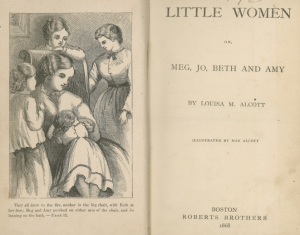Tag : and then we grew up
January 22, 2020 by Sarah M. Seltzer
I Thought I Was Jo: Revisiting “Little Women.”
 I thought I was Jo.
I thought I was Jo.
Most people thought they were Jo, it’s true, but I really did, as I inhaled Louisa May Alcott’s Little Women. I tucked it in between the pages of my siddur on Yom Kippur, standing and sitting as instructed by the rabbi, but frolicking in Concord Massachusetts all the while. I was so much like her: mad about injustice, messy, impulsive, bookish, bossy on the playground as I dictated to my friends what we would be pretending that day.
Greta Gerwig’s new, much-ballyhooed film adaptation of Little Women emphasizes Jo’s journey from director of childhood theatricals and imaginary games to successful novelist. Yet it’s not a simple triumph. Jo loses her sister, the possibility of romance torpedoes her closest friendship; her other sisters face their own cares, and her writing life is often more mercenary than glamorous. The film draws out a particular current of bittersweetness from the book, rueing the onset of adulthood; for women, who face pigeonholing (but really for all children, even Laurie, a young man who wants to be part of the play-acting of his girl neighbors) the bigger story is of the gradual winnowing down of childhood’s wild potential.
- 3 Comments
 Please wait...
Please wait...